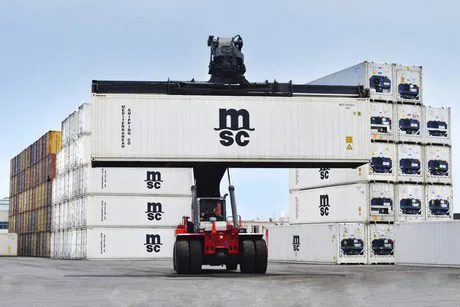The Spanish citrus sector is looking for new opportunities outside Europe, given the signs of market saturation observed in recent years and a pressure on prices that often keeps the profits at a minimum. Canada, and especially China, are destinations that are increasingly attractive for exporters. Although Canada is more consolidated as an export destination, China is still being discovered and this entails more challenges, given the long distance, which requires very specialized logistics services. This is explained by Julio Nestar, Reefer Manager of MSC Spain, who believes that it is also necessary and essential to sign new protocols to allow the export of citrus to new markets, such as Japan.
 Julio Nestar, Reefer Manager of MSC Spain.
Julio Nestar, Reefer Manager of MSC Spain.
"Canada is an important destination for Spanish fruit and vegetable exports, which are currently benefiting from the increase in local production costs and the higher cost of shipping from California to Canada. Also, our transit times are very competitive and this allows us to export a wide range of high quality fruits and vegetables to this market."
Regarding China, Julio Nestar explains that is a relatively new market for Spanish producers and one where fruit exports have grown exponentially, exceeding 20,000 tons in the latest campaign. "The country's economic growth is making it possible for the middle class to grow exponentially year after year. The prospect is that it will exceed 600 million people in the coming years. This factor tells us that the import of fruits in China, which in 2017 already exceeded 4 million tons, will continue to grow at very high rates year after year."
"This coming campaign, we expect orange exports to increase considerably again due to several factors. On the one hand, the weather conditions in China have taken a negative toll on the local citrus production. On the other, the US, which to date had been one of the largest citrus suppliers, with a volume totaling 68,000 tons last year, currently has to pay 50% tariffs. Furthermore, we also have to take into account that the main Spanish producers expect to have a greater quantity of premium quality oranges, which are the ones demanded by Chinese consumers; therefore, countries such as Spain and Egypt could consolidate, together with Chile and Australia, as China's main orange suppliers. Also, China's imports could exceed 400,000 tons in 2019," says the reefer transport expert.
"Our main objective is to help our clients develop their business in markets where the long transit times have traditionally been an obstacle for certain fruits and vegetables. The improvements in our services, added to the large investments we are constantly making in state-of-the-art refrigerated containers, such as the Carrier Primeline, together with the use of controlled atmosphere systems, allow us to transport the fruit for much longer and reach the final destination with a product with the highest quality, freshness and firmness."
Taking into account that China is a destination with a long transit time and quite demanding quality protocols when it comes to cold treatment, the risks involved in exporting there are high. In fact, there are exporters who have lost a lot of money because the fruit has not arrived in the condition that we expected.
What is MSC's experience of shipping Spanish oranges to China?
Our experience is positive. We have worked very closely with our customers, agronomists, refrigeration technicians and phytosanitary authorities to optimize this type of shipments and thus be able to offer the most efficient service in the market, with the highest success rate, offering our customers maximum transparency by providing the USDA probe readings. Moreover, in certain cases, we cover any expenses derived from the possible failure of this cold treatment. This includes the price difference if the goods have to be sold in another country where cold treatment is not a requirement," says Julio Nestar.
"The key is not only to comply with the requirements of the phytosanitary authorities, but to do so by shipping the oranges at the highest possible temperature, so as to prevent the cold from damaging them. MSC has been able to customize the operation of its containers, making it possible to comply with the protocols while working with temperatures not lower than 1ºC during the entire journey. Therefore, MSC is currently the best option for citrus exporters shipping to the Far East, and consequently, the shipping company handles most of the orange exports to China," he says.
With regard to lemons, Spanish exports are still very low because the cold treatment required by the Chinese authorities is very aggressive.
According to Julio Nestar, lemons are a product that generally has a low relative humidity and therefore it is difficult to comply with the protocols required by China. The Asian giant asks for the fruit's pulp to travel at a maximum temperature of 2.1ºC (or below) for 21 days, and the fruit suffers cold damage at such low temperatures. "In my opinion, it would be necessary for the competent phytosanitary authorities of China to enforce a more lenient protocol, increasing the temperature by extending the treatment for a few days, since the transit times from Spain to the main ports of China would still allow us to arrive with the treatment completed."

MSC is a leading company in the maritime transport of perishable products that offers a global service thanks to its 200 routes worldwide. These are operated by more than 490 ships that reach the main ports around the world with the most competitive transit times in the market. In 2017, it transported more than 1.4 million TEUs of goods under controlled temperature conditions. Of these, 40,000 TEUs were shipped under Controlled Atmosphere conditions and 20,000 TEUs were subject to cold treatment. "We constantly invest not only in container ships, but also in terminals, warehouses and ground transportation in order to be able to offer all our customers a door-to-door service," says the expert.
"We have more than 1,000 experts in perishable goods. In this way, we can offer global coverage, but also a local service in more than 155 countries around the world. Unlike other shipping companies, we have a department exclusively dedicated to reefer cargo, highly specialized in the transport of perishable products, which includes the sales, operations, customer services, land transport and documentation. In this way, we are able to offer a speedy, flexible and personalized service at all times, always adapted to the needs of our customers and the particularities of each destination. It is a sort of cargo that requires very special attention," concludes Julio Nestar.
For more information:
+34 96 335 9100
esp-reefer@msc.com
www.msc.com/fruit
